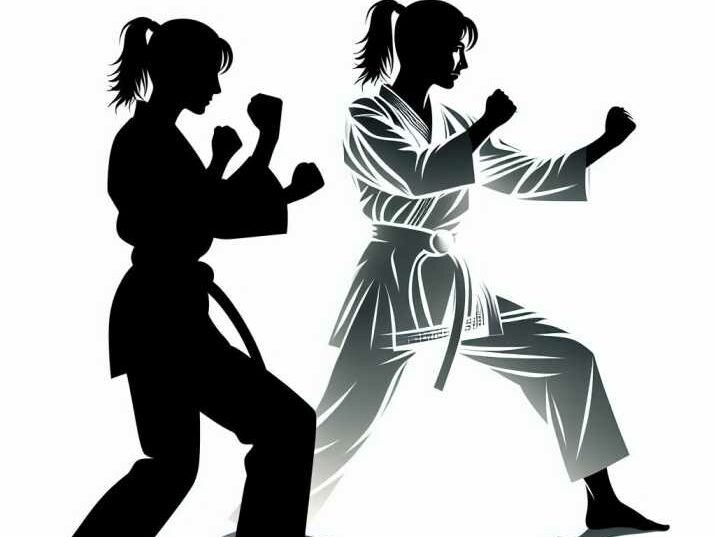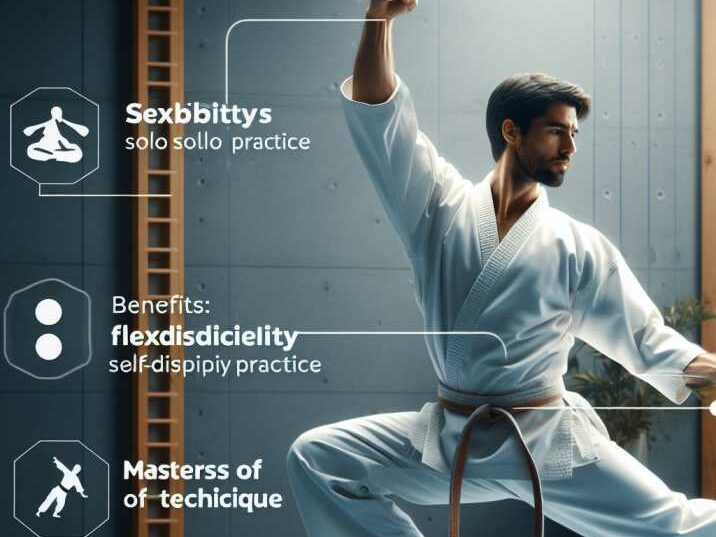Introduction:
Table of Contents
In the world of martial arts, Karate stands out as one of the most popular and effective forms of self-defense and physical conditioning. However, many aspiring martial artists wonder whether Karate can be practiced alone or if it requires a partner. The truth is, while Karate is traditionally taught in a group setting with partners, there are indeed ways to solo Karate practice. In this article, we’ll delve into the world of solo Karate practice, exploring its benefits, challenges, and techniques.

Benefits of Solo Karate Practice:
Solo Karate practice offers a range of benefits for practitioners of all levels. Here are some of the key advantages:
- Flexibility: One of the greatest benefits of solo Karate practice is its flexibility. Practitioners can train anytime, anywhere, without relying on a partner’s availability.
- Self-Discipline: Solo practice requires a high level of self-discipline and focus, helping practitioners develop mental strength and resilience.
- Mastery of Technique: Practicing alone allows individuals to focus on perfecting their techniques without distractions, leading to greater mastery of the art.
- Physical Conditioning: Solo Karate drills and exercises provide an excellent workout, improving strength, flexibility, and cardiovascular health.
- Creativity: Without the constraints of a partner, solo practitioners can explore their creativity and develop unique training routines.
Challenges of Solo Karate Practice:
While solo Karate practice offers numerous benefits, it also comes with its own set of challenges:
- Lack of Feedback: Practicing alone means missing out on immediate feedback from a partner or instructor, which can hinder progress.
- Limited Sparring Opportunities: Sparring is an essential aspect of Karate training, and solo practitioners may struggle to find opportunities for live sparring.
- Motivational Issues: Without the support and camaraderie of fellow students, solo practitioners may experience motivational challenges.
- Risk of Injury: Without proper supervision, solo practitioners may be more susceptible to injuries resulting from incorrect technique or overtraining.
Techniques for Solo Karate Practice:
Fortunately, there are several techniques that solo practitioners can employ to maximize their training experience:
- Shadowboxing: Shadowboxing involves practicing Karate techniques in the air, focusing on form, speed, and power. It’s an excellent way to improve technique and conditioning.
- Bag Work: Utilizing punching bags, kicking pads, or even homemade alternatives like pillows can provide solo practitioners with targets for striking and kicking drills.
- Kata Practice: Katas are predetermined sequences of movements that simulate combat scenarios. Solo practitioners can perform katas to improve fluidity, timing, and coordination.
- Visualization: Visualization techniques involve mentally rehearsing Karate techniques and scenarios, enhancing muscle memory and mental focus.
- Solo Drills: There are numerous solo drills that practitioners can perform to improve specific aspects of their Karate skills, such as footwork, blocking, and counterattacking.

Table of Information:
| Technique | Description |
|---|---|
| Shadowboxing | Practicing Karate techniques in the air to improve form, speed, and power. |
| Bag Work | Utilizing punching bags or pads for striking and kicking drills. |
| Kata Practice | Performing predetermined sequences of movements to enhance fluidity, timing, and coordination. |
| Visualization | Mentally rehearsing Karate techniques and scenarios to enhance muscle memory and focus. |
| Solo Drills | Performing specific exercises to improve footwork, blocking, and counterattacking techniques. |
Conclusion:
In conclusion, while Karate is traditionally practiced in a group setting with partners, solo practice can be a valuable supplement to regular training. By incorporating solo practice techniques into their routine, practitioners can enhance their skills, develop self-discipline, and achieve mastery of the art. Whether you’re a beginner or an experienced martial artist, solo Karate practice offers a wealth of benefits that are worth exploring.
FAQs:
- Can I learn Karate by myself?
- Yes, solo Karate practice is possible and can be highly effective with dedication and proper technique.
- How often should I practice Karate solo?
- Aim for regular practice sessions, ideally several times per week, to see significant improvement.
- Is it necessary to have prior experience to practice Karate alone?
- While prior experience can be beneficial, beginners can also start practicing Karate solo by learning basic techniques and gradually progressing.
- What equipment do I need for solo Karate practice?
- Minimal equipment such as a training space, suitable attire, and basic protective gear (if applicable) is sufficient for solo practice.
- Can solo Karate practice replace training with a partner or instructor?
- While solo practice is valuable, it’s essential to supplement it with regular training under the guidance of a qualified instructor for comprehensive skill development.


